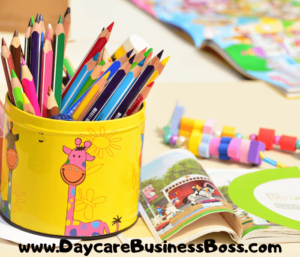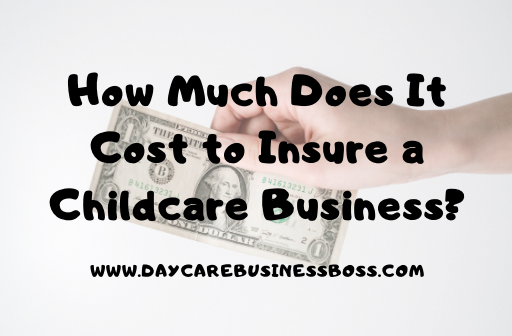If you are thinking about starting your own Childcare business, there are some costs that you should consider. One of those costs that can be often overlooked is insurance.
So, what is your Daycare insurance going to cost?
The cost to insure a childcare business is typically between $500 and $2,000 annually. There are several factors to think about to determine the types of insurance you need. The different types, how much coverage you need, and your state laws will determine the costs. Another consideration is whether you are planning to run the business out of your home or rent a commercial space.
Why do you need daycare insurance?
The answer is to transfer some financial risk. Having certain types of insurance in place takes some of the risks of you, personally, and puts it onto the insurance company. You pay small premiums, and they pay out big money.
The following is a list of the typical types of insurance policies that a childcare business (or any other business) should seriously consider:
-
Renter’s or Homeowner’s Insurance:
 If you run your childcare business out of your home or apartment your renter’s or Homeowner’s policies will rarely cover business activities. You may need to add an endorsement to your current policy or get a stand-alone policy. The coverage could be limited. There are several different types of property insurance to research depending on your state and the buildings or contents you want to protect.
If you run your childcare business out of your home or apartment your renter’s or Homeowner’s policies will rarely cover business activities. You may need to add an endorsement to your current policy or get a stand-alone policy. The coverage could be limited. There are several different types of property insurance to research depending on your state and the buildings or contents you want to protect.
There are also commercial plans if you choose to run your business outside your home. The cost will be determined based on your state and the type of coverage you are looking for. A business property insurance policy would also cover furniture, computer equipment, and other contents in the place of business.
For a childcare business, this could mean, tables, chairs, play carpets, desks, games, books, and of course toys!
-
General Liability Insurance:
General Liability Insurance covers a wide array of issues that may arise with any business. Specific to childcare, this broad type of insurance policy would cover things like certain accidents, child abuse, parents or children being injured on your property, etc. What if little Johnny falls off your see-saw during recess and loses two front teeth or, heaven forbid, breaks a bone? What if a parent slips and falls on ice on your property? These are the types of incidents that general liability protection covers.
Even if it is a minor incident, there is a potential for people to sue if they choose. You need to make sure you and your business are protected just in case. These policies are often very inexpensive and vary from state to state and carrier.
-
Professional Liability (Errors & Omissions) Insurance:
I know I just spoke about General liability insurance above. So why do childcare businesses consider professional liability on top of General liability? It’s simple. They cover two different types of liability.
Professional liability covers things like negligence. Like mal-practice insurance for doctors, it covers wrongful practices by professional service providers. When caring for children, this type of coverage is extremely important. It helps pay your legal fees if you or one of your staff causes harm to a child while providing professional services.
For example, you feed a child a snack that they are allergic to, and it causes a severe reaction. Liability insurance covers any excess liability that all your other policies do not cover.
-
Abuse & Molestation Coverage:
Unfortunately, when taking care of people, especially children, there is a risk of sexual misconduct or other types of abuse accusations. Such allegations are hopefully rare but if they do occur, the consequences can be devastating to your business.
Abuse and molestation insurance cover these allegations by helping with legal fees and settlements. Although some of these instances may be covered under your professional or general liability policies, it would be highly limited or capped on the payout amount. There are stand-alone policies out there to ensure that you are adequately covered in the case of legal battles.
It is important to note, that it doesn’t matter whether the accused is innocent or guilty. The policy is designed to cover legal fees.
-
Commercial Auto Insurance:
 Everyone that drives a car knows what auto insurance is because we carry it on our private vehicles. However, your personal auto insurance policy does not usually cover business use and is usually limited on how much it covers for uninsured motorists, bodily injury or medical expense, or comprehensive on the vehicle itself.
Everyone that drives a car knows what auto insurance is because we carry it on our private vehicles. However, your personal auto insurance policy does not usually cover business use and is usually limited on how much it covers for uninsured motorists, bodily injury or medical expense, or comprehensive on the vehicle itself.
or example, if you put one of the children in your personal car and get into an accident, you are not completely covered. If you are going to use your personal vehicle or your employees are using their vehicles to transport any children, you should have a separate Commercial Auto Insurance policy.
Think field trips! What child doesn’t love field trips!
-
Worker’s Compensation Insurance:
This type of insurance protects you, the business owner, from employees’ claims for work-related injuries or illnesses. All states require a business owner to have worker’s compensation insurance if they have employees. Some states require self-employed individuals to also carry worker’s compensation insurance. The coverage includes medical expenses, rehabilitation costs, and lost wages. You pay a monthly premium for worker’s compensation insurance like you would for any other insurance.
For a childcare business, it is very important to keep yourself and your employees healthy and covered so you can all get back to doing what you do best…. taking care of the children.
-
Accident & Accidental Death Insurance:
As the name suggests, this insurance covers accidents such as falls, burns, drowning, or any other unforeseeable incident that other insurance policies do not cover. There is also accidental death insurance that pays a lump sum to your beneficiaries if you die from an accident. Most Health Insurance and Life Insurance policies do not payout in the case of accidents like a plane or car accidents. If you have employees, you may also be able to offer group plans and split some of the costs with them.
In the case of a daycare business, this could mean that if something happened to you or one of your employees, they would have the money to continue running the business.
-
Health Insurance:
This is another insurance policy that we all know a little bit about. Typically, group health insurance comes into play if you have full-time employees. Here is what most start-up businesses do not know. Since the Affordable Care Act was enacted into law, the IRS changed the definition of a full-time employee for eligibility of group benefits. The definition of a full-time employee is based on monthly hours worked.
If an employee works an average of 30 hours per week or a total of 130 hours in a month, they are entitled to benefits. There is also a “full-time equivalent” employee. For example, if a business has two part-time employees, the IRS can count them as one full-time employee. These rules usually only apply to large businesses of 50+ employees. If you are just starting, you probably do not have to worry for now. The goal of any business is to grow, however and should be aware of the laws in advance.
I know that sounded crazy technical but in your case of wanting to run a successful daycare, you want to keep yourself and your employees healthy and secure. A lot of times, employees need benefits.
In the financial planning business, it’s what we like to call the “golden handcuffs.” That basically means that to keep your employees loyal, you are going to have to sweeten the deal for them to stay with you long-term.
-
Life Insurance:
Most of us do not consider life insurance for our businesses but it can be a major asset. If you are running a business or have an income that your household or business partners depend on, you should consider life insurance. If you die, the beneficiary of the policy will be paid out.
 This money can be used to pay off mortgages, pay for dependent care, and replace some of your income. As a financial advisor, myself, I use life insurance as a valuable tool for a lot of small and large businesses and their families.
This money can be used to pay off mortgages, pay for dependent care, and replace some of your income. As a financial advisor, myself, I use life insurance as a valuable tool for a lot of small and large businesses and their families.
There are also group term life insurance policies that you can provide to your employees without having to qualify for it (e.g., health exams) and you could qualify for a tax deduction.
Once again, it’s all about keeping the business up and running to continue providing the best care possible for the children and providing a much-needed support system for their working parents!
-
Business Interruption Insurance:
In case of a major catastrophic event, such as a storm or other disaster, that causes your business to stop operating, business interruption insurance could reimburse you for lost income. Say there is a major hurricane or power outage for a significant amount of time and the children and/or employees cannot come to your physical location. It is considered a disruption in the ability for you to operate your business. This type of policy could help in those types of unforeseen situations.
As a small daycare operation, you depend on those parents to pay their tuition to help put food on your table. Your employees also depend on your ability to pay them for their work helping you take care of all the children.
Learn more about what you need to know about insurance HERE!
Related Questions:
How do I legally set up my new daycare?
Talk to your CPA about what you want to do and let him or her advise you on the setup that works best for you and your personal situation. There are several different ways to set up a business for tax and liability purposes. Some of the types of businesses are sole proprietors, LLC’s, LLP’s, Corporations, and Partnerships.
How do I get parents to sign up for my daycare?
To get people to sign up for your specific daycare, ask your friends and neighbors first. What are they doing for childcare and what do they like or dislike about their current caregivers? Join some parenting groups to meet other parents that participate in those programs. Network with local businesses that employ working mothers. Social media is a great tool, too!
It usually takes some time for any business to get off the ground so have faith, patience, and a lot of support to keep you encouraged. With the right guidance, you will be well on your way to building your own successful business.

Please note: This blog post is for educational purposes only and does not constitute legal advice. Please consult a legal expert to address your specific needs.
To learn more on how to start your own daycare checkout my startup course and documents here.

Meet Shawn Chun: Entrepreneur and Childcare Business Fan.
I’m a happy individual who happens to be an entrepreneur. I have owned several types of businesses in my life from a coffee shop to an import and export business to an online review business plus a few more and now I create online daycare business resources for those interested in starting new ventures. It’s demanding work but I love it. I do it for those passionate about their business and their goals. That’s why when I meet a childcare business owner, I see myself. I know how hard the struggle is to retain clients, find good employees and keep the business growing all while trying to stay competitive.
That’s why I created Daycare Business Boss: I want to help childcare business owners like you build a thriving business that brings you endless joy and supports your ideal lifestyle.



1 thought on “How Much Does It Cost to Insure a Childcare Business?”
Comments are closed.